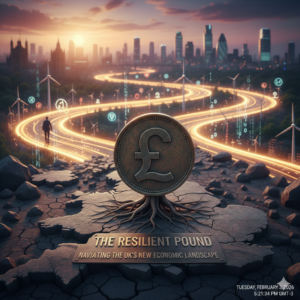
Start Early, Think Big: Road-mapping Your Financial Foundation
Credit cards can be powerful tools for building credit, racking up rewards and managing cash flow. But the wrong habits can quickly create expensive debt and financial stress — particularly here in the UK, where average household credit card balances are still high. This is a guide that will take you through some practical, no-bs tactics to help you manage your credit cards and not end up in debt in 2025.

💡 Step 1️⃣ : Identify Specific and Realistic Goals
You need to know what you want accomplishing the step 1 in financial planning. This can involve the following, but not limited to, for young professionals:
- Saving for a house deposit
- Eliminating student loans, or other debts
- Building an emergency fund
- ISAs and Pensions: Investing for the future
- Plan life events (wedding, business starting and traveling)
Step 2: Monitor your Earnings & Expenses
You can’t manage your finances if you have no idea where the money went. Use budgeting apps like:
- Money Dashboard
- Emma
- YNAB (You Need a Budget)
Divide your expenses into the bone categories of housing, transport, food, entertainment and savings.
50/30/20 Rule — Initial:
- 50% needs (rent, bills, groceries)
- 30% of discretionary – wants (eating out, travel, hobbies)
- 20% savings/investments
🛡️ Step 3: Create an Emergency Fund
Life is unpredictable. Your emergency fund is your back up in the event of unforeseen costs — a car repair, loss of job, medical bills etc.
- Aim for 3 to 6 months in living expenses
- Put it in an accessible savings account that offers good interest rates
- DO NOT put this money into a high-risk asset — it should remain liquid and safe.
Popular UK options:
- Nationwide FlexDirect Saver
- Marcus by Goldman Sachs
- Santander eSaver
📈 Step 4 — Investing Early
Invest in the stock market early because time is money and the more you wait, the less potential for compounding returns you have.
Tools UK Millenials Can Invest With
- Stocks & Shares ISA — save up to £20,000 in tax free growth per year
- Lifetime ISA (LISA) — Lend through the Government for a first home or retirement savings
- Pensions (Workplace & Personal) — Max your employer match!
- Low-cost platforms for beginners:
- Vanguard UK
- Freetrade
- Nutmeg
Step 5: Repay and Reduce Your Debts
Debt can destroy your dream of becoming wealthier. Focus on:
- Pay down debts with the highest interest first (credit cards, payday loans)
- Balance Transfer Cards for Consolidation at 0%
- These Payments Will Prevent Penalties, Reduce Interest
- Maintain credit utilisation of less than 30% to improve your CIBIL Score
Step 6: Learn and Earn💡
Budgeting and saving is one thing, but finding ways to increase your income can ultimately do wonders for your financial health.
Ways to boost earnings:
- Side or Freelance projects
- Certificants or credentialed in collectible specialties
- Negotiating salary increases at work
- Look for Stream of passive income (dividends, rentals etc)
Step 7: Plan for Big Life Events at Home
Whether that be owning our first home, starting a family or travelling the world we have to set a plan in place.
Buying a Home:
- With a Lifetime ISA you earn a government bonus
- Look into Shared Ownership or Help to Buy
- Buyer deposit required: at least 5–10%
Marriage or Starting a Family:
- Develop a common budget with your spouse
- Life insurance and income protection insurance
- Invest for kids’ future educational costs in a Junior ISA
📜 Step 8: Coverage (Insurance)
Financial planning is not just about building wealth, also preserving it.
Consider:
- Income protection cover — pays you a percentage of your income if you are unable to work.
- Life insurance – To help your family financially if you die
- Critical illness cover – Get a lump sum if you are diagnosed with a life-changing ailment
🏁 Conclusion: Begin Today, the Payoff Will Come Later
Finance for the Twenties and Thirties is based on creating good habits, as well as making informed decisions that you will be able to sustain throughout your life.
If you can start early with even little amounts, it will help you in compounding your returns, reduce financial stress and allow you to have the freedom to make choices according to what aligns with your values/goals.
The UK has a wealth of tools available for you — tax-efficient ISAs, uplifts by the government, a windfall from your employer through pensions. Add in the virtues of disciplined budgeting, debt management and being a knowledge hungry life long learning machine: set to grow – you are ready for financial freedom.
Our Post


The Resilient Pound: Navigating the UK’s New Economic Landscape


